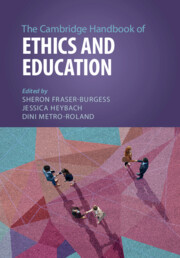Book contents
- The Cambridge Handbook of Ethics and Education
- The Cambridge Handbook of Ethics and Education
- Copyright page
- Epigraph
- Contents
- Figures
- Tables
- Contributors
- Foreword
- Preface
- Acknowledgments
- Part I Traditions in Ethics and Education
- 1 Ancient Chinese Ethics and Education
- 2 Ancient Greek and Roman Ethics and Education
- 3 Ubuntu Ethics and Education in Southern Africa
- 4 Ethical and Environmental Knowledge and Education
- 5 Ethics, Education, and the Inheritance of Abraham
- 6 Prioritizing Outcomes
- 7 Freedom and the Ethics of Educational Authority
- 8 Moral Education in the Virtues
- 9 The Ethics of Bildung and Liberal Education
- 10 American Pragmatism, Democratic Ethics, and Education
- 11 Radical Ethics
- 12 The Ethics of Phenomenology and Hermeneutics in Education
- 13 Feminist Ethics and the Contradictions of Gender
- 14 Postmodern/Poststructuralist Ethics and Education
- Part II Ethics and Education in Practice
- Part III Emerging Ethical Pathways and Frameworks
- Index
- References
5 - Ethics, Education, and the Inheritance of Abraham
An Essay in the Pedagogy of Difference
from Part I - Traditions in Ethics and Education
Published online by Cambridge University Press: 07 March 2024
- The Cambridge Handbook of Ethics and Education
- The Cambridge Handbook of Ethics and Education
- Copyright page
- Epigraph
- Contents
- Figures
- Tables
- Contributors
- Foreword
- Preface
- Acknowledgments
- Part I Traditions in Ethics and Education
- 1 Ancient Chinese Ethics and Education
- 2 Ancient Greek and Roman Ethics and Education
- 3 Ubuntu Ethics and Education in Southern Africa
- 4 Ethical and Environmental Knowledge and Education
- 5 Ethics, Education, and the Inheritance of Abraham
- 6 Prioritizing Outcomes
- 7 Freedom and the Ethics of Educational Authority
- 8 Moral Education in the Virtues
- 9 The Ethics of Bildung and Liberal Education
- 10 American Pragmatism, Democratic Ethics, and Education
- 11 Radical Ethics
- 12 The Ethics of Phenomenology and Hermeneutics in Education
- 13 Feminist Ethics and the Contradictions of Gender
- 14 Postmodern/Poststructuralist Ethics and Education
- Part II Ethics and Education in Practice
- Part III Emerging Ethical Pathways and Frameworks
- Index
- References
Summary
This chapter considers the major Abrahamic faiths on a continuum from dynamic to dogmatic. On the dynamic side lies the God of covenant and a life consistent with an open society. On the dogmatic side lies the ruler of the universe and a life aligned with a closed society. Readings of Abraham’s story leaning toward the dynamic end of this continuum are more authentic than those tending toward the dogmatic end. Dynamic readings of Abraham’s legacy are also more ethically robust and their transmission more genuinely educational, conceived as initiation into intelligent worldviews while learning from and about alternatives. This dialogical concept of education, called the “pedagogy of difference,” can lead us out of our current morass in which people of deep difference are increasingly incapable of communicating with one another.
Keywords
- Type
- Chapter
- Information
- The Cambridge Handbook of Ethics and Education , pp. 82 - 105Publisher: Cambridge University PressPrint publication year: 2024



